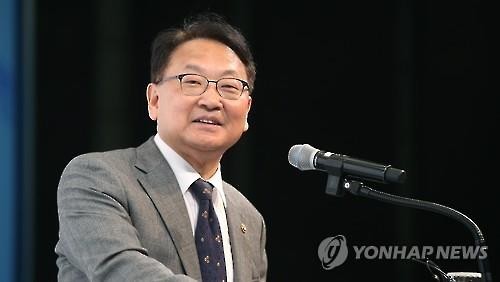Finance Minister Yoo Il-ho suggested last week the government would no longer adhere to its projection that the country’s economy would grow by 3.1 percent this year.
Yoo, who doubles as deputy prime minister for economic affairs, said the government would be “cool-headed” in adjusting the growth target when it announces in late June the economic policy directions to be pursued in the latter half of the year.
Yoo, who doubles as deputy prime minister for economic affairs, said the government would be “cool-headed” in adjusting the growth target when it announces in late June the economic policy directions to be pursued in the latter half of the year.

His remarks came a day after the Korea Development Institute, a state-run think tank, joined other economic organizations at home and abroad in revising down the 2016 growth forecast for Asia’s fourth-largest economy below 3 percent.
Korea saw its annual growth reach 2.6 percent in 2015, ranking 12th among the 34 member states of the Organization for Economic Cooperation and Development. It marked the first time since 2006 that the country failed to make the top-10 list of the fastest growing economies of the Paris-based organization.
This downward trend has perplexed policymakers here, who have continued to stick to the rate of growth in gross domestic product as a major gauge of economic achievement, though many economists have raised skepticism about the relevance of the indicator amid socioeconomic changes prompted by technological advancement.
President Park Geun-hye’s administration has said it is putting the policy focus on increasing employment. Yet its officials have still adhered to keeping the growth target above 3 percent, which they seem to regard as the bottom line that should be buttressed to prevent the economy from being dragged into a low-growth rut.
Since Park took office in February 2013, the country’s growth has hovered below 3 percent except for 2014 when it reached 3.3 percent.
Critics note government policymakers have made overly rosy forecasts, saying policy efforts to spur growth with short-term stimulus will not help strengthen long-term growth potential. Adherence to a growth target that is realistically unachievable will also hamper the sound management of the economy, they argue.
Bank of Korea Gov. Lee Ju-yeol recently added his voice to the critical view of relying on GDP, which measures the monetary value of all the finished goods and services produced within a country’s borders in a specific time period.
In a meeting with local economists, he said the credibility of GDP figures is on the decline as it fails to reflect changing industrial landscapes such as the rise of the digital economy and the growing importance of the service sector. Given these changes, the top central banker said, downward revisions to GDP forecasts by 0.1 to 0.2 percentage points does not carry as much significance as it did in the past.
Lee said the BOK would develop a new indicator to supplement and offset the limitations of GDP statistics and take a more accurate measurement of quality of life.
According to data from the International Monetary Fund, Korea’s GDP amounted to $1.4351 trillion last year, the 11th largest in the world.
Shin Se-don, professor of economics at Sookmyung Women’s University in Seoul, said that, from the viewpoint of individual happiness, GDP is an improper indicator. He took note of the discrepancy between the growth of GDP and household income in recent years. Household income grew faster than GDP in 2011 and 2012 but the trend was reversed in 2013. Last year, household income showed a 1.6 percent increase on-year, far below the GDP growth of 2.6 percent.
Experts also call on the central bank to improve the way of compiling price statistics to more accurately reflect the impact on the lives of ordinary people. A study by the National Assembly Budget Office showed price hikes actually felt by consumers have been two times higher than consumer price indexes announced by the central bank since 2013.
While agreeing on the limitations of GDP in assessing the qualitative aspect of growth, some economic commentators say it should not be allowed to justify the practice of government and central bank officials setting an overly rosy growth target only to revise it downward repeatedly.
The BOK last month lowered the 2016 growth projection for Korea’s economy to 2.8 percent from the 3 percent it predicted at the start of the year probably under some pressure to be in step with the government’s position.
Critics note it may seem out of place to argue that the inaccuracy in the initial growth estimate is due to the failure to reflect changing industrial landscapes. They say the government and the central bank should be more objective and cool-headed to put forward more correct forecasts that economic actors can count on.
By Kim Kyung-ho (khkim@heraldcorp.com)
-
Articles by Korea Herald





![[Herald Interview] 'Amid aging population, Korea to invite more young professionals from overseas'](http://res.heraldm.com/phpwas/restmb_idxmake.php?idx=644&simg=/content/image/2024/04/24/20240424050844_0.jpg&u=20240424200058)












![[KH Explains] Korean shipbuilding stocks rally: Real growth or bubble?](http://res.heraldm.com/phpwas/restmb_idxmake.php?idx=652&simg=/content/image/2024/04/25/20240425050656_0.jpg&u=)

